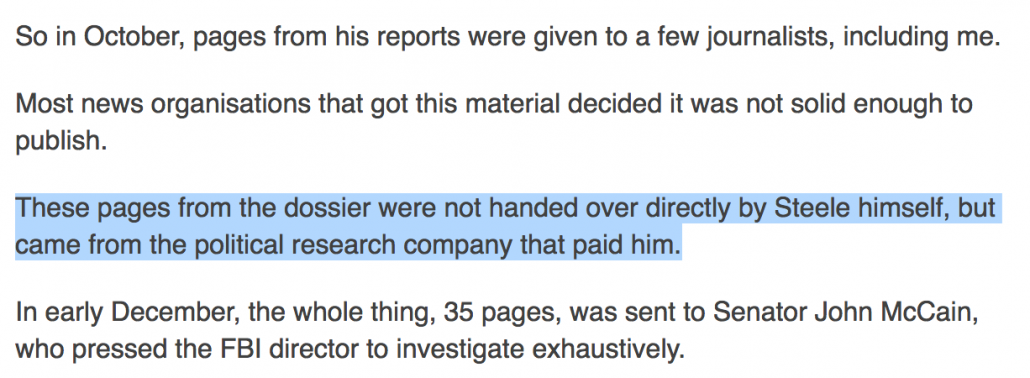Paul Wood is the BBC reporter who, in a January story focusing largely on MI6 officer Christopher Steele’s dossier, repeated the Louise Mensch report that the government had obtained a FISA order targeting two Russian banks.
On 15 October, the US secret intelligence court issued a warrant to investigate two Russian banks. This news was given to me by several sources and corroborated by someone I will identify only as a senior member of the US intelligence community. He would never volunteer anything – giving up classified information would be illegal – but he would confirm or deny what I had heard from other sources.
Last night he posted another story, confirming that one of the figures described in Steele’s dossier as having been withdrawn from DC because of his close ties to the election operation, Mikhail Kalugin, was indeed a Russian spy operating under diplomatic cover.
[S]ources I know and trust have told me the US government identified Kalugin as a spy while he was still at the embassy.
[snip]
A retired member of a US intelligence agency told me that Kalugin was being kept under surveillance before he left the US.
But I’m more interested in the vague details Wood offers about Steele’s past cooperation — and how he pitches a claim that the FBI is screwing up the investigation.
Remember: the public story is that only the FBI had any contact with Steele. But the first time this article describes him sharing information he collected for other sources with US intelligence agencies, it doesn’t specify that.
I understand – from former officials – that from 2013-16, Steele gave the US government extensive information on Russia and Ukraine.
This was work done for private clients, but which Steele wanted the US authorities to see.
One former senior official who saw these reports told me: “It was found to be of value by the people whose job it was to look at Russia every day.
Indeed, the article distinguishes between what those agencies believed about Steele from what the FBI did.
In light of his earlier work, the US intelligence community saw him as “credible” (their highest praise).
The FBI thought the same; they had worked with Steele going back to his days in MI6.
The article goes on to complain that Steele never briefed the CIA on the dossier, which it explains by saying his Russian related contacts had moved on.
But the CIA never interviewed him, and never sought to.
This comes from several people who are in a position to know.
[snip]
I understand that Steele himself did not ask to brief the CIA because he had a long-standing relationship with the FBI.
The Russia people at the CIA had moved on and he felt he did not have the personal contacts he would need.
As a reminder, the Intelligence Community offered completely ridiculous explanations for when it first obtained the dossier, which were implausible, even ignoring the way they pretended FBI wasn’t part of the IC.
In any case, having laid out these distinctions, the article then voices the complaints of those who believe the FBI is screwing the investigation up, and that only CIA has the contacts to conduct it.
This comes from several people who are in a position to know.
They are alarmed at how the investigation is going, and worry it is being fumbled.
One said: “The FBI doesn’t know about Russia, the CIA knows about Russia.
“Any sources Steele has in Russia, the FBI doesn’t know how to evaluate.
“The Agency does… Who’s running this thing from Moscow? The FBI just aren’t capable on that side, of even understanding what Chris has.”
The article cites one reason this complaint is bogus — the CIA, along with other agencies, are part of the task force investigating this case. It doesn’t explain why the theory voiced by its sources — that the Russians would need to steal voter roll data from states (or even cooperate with Trump) to micro-target messages. Voter rolls are readily available. And while cooperating with Trump’s campaign would make micro-targeting more effective, it would not be necessary for a knowledgable person.
In any case, these complaints sound like the excuses given for why Steele did not, ultimately, take payment from FBI (which I discussed here), with one difference. It wasn’t just that Steele thought the FBI was paying too much attention on Hillary’s email campaign, but he thought publicizing his dossier would make the difference in the election.
“He really thought that what he had would sway the election,” said one.
That claim, with questions introduced by this article about which agencies he has worked with, is rather interesting.
One final point. After the article got posted, the Beeb took out a critical line (highlighted below) claiming that Steele didn’t share his dossier with reporters himself, but instead did so through his employer.
That doesn’t make sense for a lot of reasons — and is belied by David Corn’s account of what happened. But I find it particularly interesting given the fact that — after Chuck Grassley first asked the FBI to provide information on the dossier — Grassley has since asked the consulting firm questions that would provide a way to double check the FBI’s claims. Fusion’s answers, which are due by April 7, might present problems for this claim, which has since disappeared. Poof!
Among the things Richard Burr suggested yesterday is that the committee may not succeed in getting Steele to testify (suggesting that being outside the country put him beyond subpoena). Given the airing of complaints from Steele and his friends here, I really look forward to seeing whether he cooperates with SSCI.
